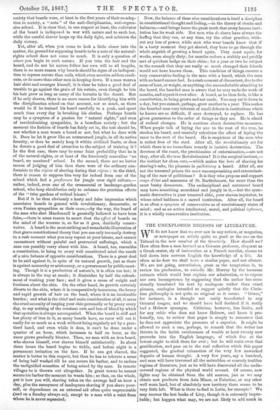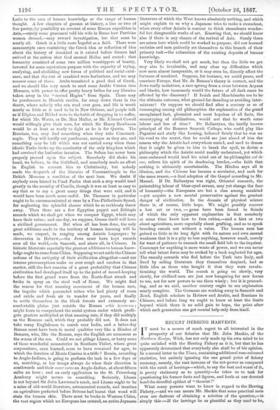THE UNEXPLORED REGIONS OF LITERATURE.
WE do not know that we ever saw in any review, or magazine, or newspaper an article quite so good as the one on the Talmud in the new number of the Quarterly. How should we? How often does a man learned as a German professor, eloquent as a Greek orator, sly of insinuation as a French novelist, choose to boil down into nervous English the knowledge of a life. As often as he does we shall have a similar paper, and not oftener. We are not going, nevertheless, great as the temptation is, to review his production, to swindle Mr. Murray by the immense extracts which would best explain our admiration, or to expose our own incompetence by suggesting that the author has occa- sionally translated his text by analogous rather than exact phrases, analogies intended to suggest quietly that the Chris- tian philosophy is not quite so original as it seems. "Grace," for instance, is a thought not easily transferred to any Oriental tongue, and we should have half doubted if it really had a Hebrew synonym. Criticism, however, has limits, and for any critic who does not know Hebrew, and know it pro- foundly, too, to review that paper is simply to announce that he does not appreciate the presence of a superior. It might be allowed to such a one, perhaps, to remark that the writer has thrown in the lavish carelessness of wealth at least twenty new proverbs into the English language, of which five at the lowest ought to stick there for ever ; but he will resist even that gratification, and pass on to the real reflection which this paper suggested, the gradual exhaustion of the very few unworked deposits of human thought. A very few years, say a hundred, and man will have traversed all the untrodden or scarcely trodden regions of literature, just as he will have discovered all the undis- covered regions of the physical world around. Of course, new lights may be obtained from the old sources, just as we may obtain new products from Asia Minor, or Palestine, or any other well worn land, but of absolutely new territory there seems to be very little left. What is there to find in Latin, for example ? We may recover the lost books of Livy, though it-is extremely impro- bable; but happen what may, we are not likely to add much in Latin to the suns of human knowledge or the range of human thought. A few chapters of guesses at history, a line or two of fine poetry, by possibility an account of some Roman expedition in Asia,—surely some proconsul told his wife in Rome how Parthian women dressed,—may reward investigation, but that must be nearly all. Greek is a little more topeful as a field. There were manuscripts once containing the Greek idea or reflection of idea about the history of shankind as it existed before Greece had arrived at the notion that God created Hellas and rested ; that humanity consisted of some two million worshippers of beauty, invested for some mysterious purpose with the capacity of trying, analyzing, and abolishing new forms of political and social exist- ence, and that the rest of mankind were barbarians, and we may recover some of these. Arabs translated a good deal of Greek, and we should like very much to send some Arabic Curzon into Morocco, with power to offer pretty heavy bribes for any libraries taken away in the "second Hegira" from Spain. There may be parchments in Moorish castles, far away down there in the desert, where nobody who can read ever goes, and life is worth nearly as little as it used to be in New Orleans,- and people talk as if Eliphaz and Bildad were in the habit of dropping in to coffee, for which Mr. Watts, or Dr. Max Muller, or Mr. Edward Cowell would willingly give their ears, for which Sir Henry Rawlinson would be at least as ready to fight as he is for Quetta. The Russians, too, may find something when they take Constanti- nople. They will hardly eat parchment, savages as they are, and soniething may be left which was not carried away when those idiotic Turks broke up the continuity of the only kingdom which had survived the barbarian invasion. The Sultan has never been properly pressed upon the subject. Somebody did shake his hand, we believe, in the Guildhall, and somebody made an effort in English to convert him to Christianity, but nobody made the despatch of the libraries of Constantinople to the British Museum a condition of the next loan. We doubt if anybody even hinted to Fund Pacha that such a step would tend greatly to the security of Candle, though it was at least as easy to say that as to say a great many things that were said, and it would have been much more useful. Dr. Thomson in particular ought to be excommunicated at once by a Pan-Philhellenic Synod, for neglecting the splendid chance which he so recklessly threw away. Then there are a few Egyptian papyri and Ethiopic records which we shall get when we conquer Egypt, which may have their value; and one day, we suppose, Greece itself will have a civilized government. But when all has been done, the only great additions made to the territory of human learning will be made, we suspect, in ranging among Asiatic Languages; by discoveries in Hebrew,—the Jews must have kept records over all the world,—in Sanscrit, and above all, in Chinese. In historic literature especially the greatest additions to human know- ledge ought to come from China. Supposing we set aside the Chinese notions of the antiquity of their civilization altogether—and our intense preconceptions make us over rough and careless in that matter, still the fact remains of a great probability that Chinese civilization had developed itself up to the point of record-keeping before the first grand wave Irons the North-East struck and broke in spray on the steel wall of Rome. We might find the reason for that amazing movement of the human race, the impulse which persuaded tribes who had plenty of room and cattle and fresh air to wander for years, and finally to settle themselves in the bleak forests and extremely un- comfortable plains just outside the Roman orbis terrarum ; might learn to comprehend the social system under which profli- gate graziers multiplied at that amazing rate, if they did multiply as the Romans said, which they probably did not. It does not take many Englishmen to march over India, and a latter-day Roman must have been in moral qualities very like a Hindoo of Benares, who, like the Roman, says the English are numerous as the waves of the sea. Could we not pillage Lhassa, or harry some of those wonderful monasteries in Southern Thibet, where great corporations, once learned, seem to have remained for ages, to which the duration of Monte Cassino is a trifle ? Russia, according to Anglo-Indians, is going to perform the task in a few days or so, marching, as her troops always do when their direction is southwards and their sneer vales an Anglo-Indian, at about fifteen miles an hour ; and an early application to the St. Petersburg Academy might secure us something. Seriously, Lhassa is not beyond Sir John Lawrence's reach, and Lhassa ought to be a mine of old-world literature, astronomical records, and treatises on agriculture perfected before Britons had learnt that woad will stain the human skin. There must be books in Western China, the vast region which no European has entered, an entire Japanese literature of which the West knows absolutely nothing, and which might explain to us. why a Japanese tries to make a steamboat, when every other Asiatic is content to think steamboats wonder- ful but disagreeable works of art. Knowing that, we should know also if there is any chance of the revival of Asia. Surely there are mines here which could be worked to purpose, did our learned societies and men patiently set themselves to this branch of their primary task—the exhaustion of the existing deposits of human. knowledge.
Very likely we shall not get much, but then the little we get may also be invaluable, and may clear up difficulties which now seem almost insuperable, or it may even be, directly affect the fortunes of mankind. Suppose, for instance, we could prove, and convince Europe, that Mr. de Bunsen's theory is correct, and the. Jews really mulattoes, _a race sprung from a cross between Aryans and blacks, how immensely would the future of all dark races be" affected. by the 'discovery ? If Isaiah and Mendelssohn are to be the ultimate outcome, what ground for dreading or avoiding inter- mixture? Or suppose we should find after a century or so of" rummaging among old philosophies the explanation of the grand unexplained fact, gloomiest and most hopeless of all facts, the- stereotyping of civilizations, would not that be worth some- labour and loss of time ? Dr. Ballantyne, the hardly known principal of the Benares Sanscrit College, who could play like- Paganini and study like Leasing, believed firmly that he was on his road to the secret, that he could see just ahead of him the- reason why the Asiatic had everywhere rested, and used to dream. that it might be given to him to break the spell, to devise a'- philosophy which the Asiatic could readily understand, yet which once embraced would lead his mind out of its philosophic cut de. sac, relieve his spirit of its deadening burden,—the faith that nothing is ultimately ascertainable. The Hindoo says all is illusion, and the Chinese has become a secularist, and each for the same reason,—a final adoption of the Gospel according to Mr. Hansel. If Dr. adlantyne was right, Oriental research, the- painstaking labour of blear-eyed sevens, may yet change the face- of humanity—the Europeans are but a clan among mankind —yet acquire a new mental preservative against the greatest danger of civilization. In the domain of physical science there is, of course, little hope. We might possibly recover- a lost art or two, — gems have been found in Scinde of which the only apparent explanation is that somebody' at some time knew how to fuse rubies,--and a hint or two about agriculture, more especially about grafting, and so to speak breeding cereals not without a value. The human race has gained so little in its long fight with its nature and own mental weakness that it is a pity to lose anything, however small, merely for want of patience to ransack the small field left to the inquirer. Contempt for anything is mere waste of power, and we can never tell what latent force may be evoked by a book neglected for ag-es. The rascally cowards who fled before the Turk into Italy, and, lived by selling literature they themselves despised, had as- little idea as those who bought it that they were revolu- tionizing the world. The search is going on slowly, very- slowly, for civilized men are just now hungering for new forces to use, not for new powers to use them wisely ; but it is proceed- ing, and as we said, another century ought to see exploration nearly complete. The Germans are working away in Sanserit and, Zend, English scholars in Hebrew and Arabie, and Russians in Chinese, and before long we ought to know at least the limits beyond which there is no solid gain to hope, the point after which each generation can get mental help only from itself.



































 Previous page
Previous page